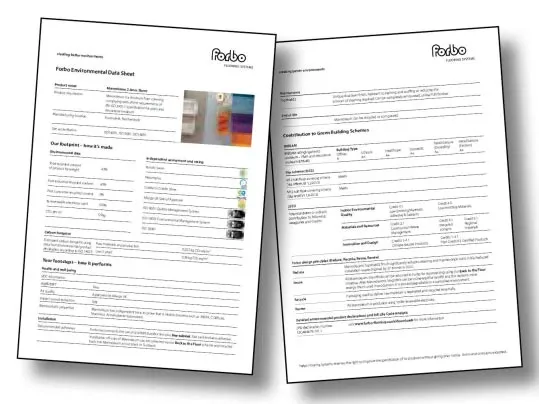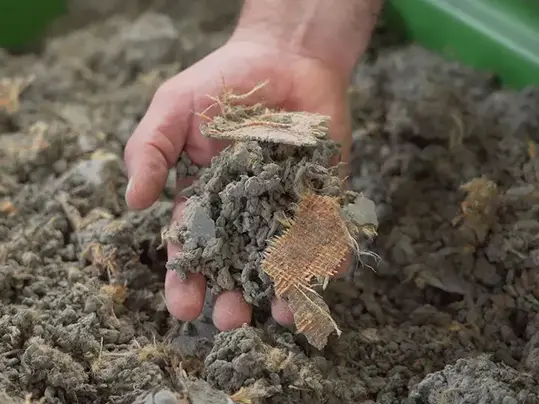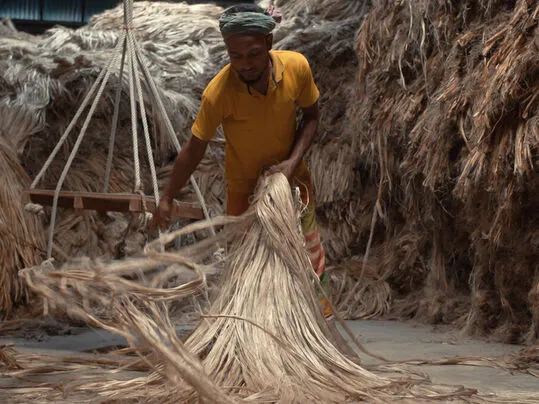Achieving circularity in flooring
Forbo Flooring Systems are pioneers in making flooring in a circular process. Find out about the key pillars guiding our ambition for circularity.

Forbo has been making floors for over a century. We have always pushed the boundaries of what is possible with flooring. We have done this by listening to the needs of our clients to improve their spaces. Now, we are listening to the needs of the planet too.
Building & construction materials create almost 11% of global CO2 emissions each year (source WorldGBC), as well as lots of waste. At Forbo, we are adopting a circular sustainability strategy to help combat this issue.
Today's economy is very much a linear economy. Products are made from raw materials, used, then thrown away. The process is a straight line. The circular economy, however, aims to eliminate waste by keeping everything in a loop. Products are designed to be taken apart and reused, and where possible new products are made with reused and recycled materials.
There is still a long way to go to bring circularity to the flooring sector. However, Forbo Flooring Systems is proud to be an industry leader. We are constantly looking to find new, clever ways to integrate circularity into our systems and products. We do this byGoing round, moving forward.
%20copy.webp)
“Creating better environments” has been our tagline and mission for years. We are very aware of the impact that flooring – as part of the built environment – can have on the natural environment. We want to do our bit to help future and existing buildings achieve carbon neutrality and minimal waste production.
We help architects, contractors and building owners achieve their sustainability goals by providing circular flooring solutions. This is our contribution to minimising the waste we create for future generations and protecting our planet.
When it comes to circularity, it is not only important what we do, but also how we do it. We work with three core principles that guide our whole circular strategy:
Data and information are key to tracking and improving sustainability. It’s not enough to make a few changes and hope for the best. We gather and publish sustainability information for all of our products and processes. This helps us track our progress and do better – and provides transparency for our customers.
We also make sure to be upfront about areas we still need to improve on. Historically, the flooring industry has not followed a circular model, and things are not going to change overnight. We celebrate our achievements, but we don’t want to greenwash.
We make all our sustainability data publicly available. We provide Life Cycle Assessments (LCAs) and Environmental Product Declarations (EPDs) for products, as well as full details of our company’s sustainability in our annual sustainability report. With transparency and the use of safe raw materials, a foundation is laid for a circular solution.


We are working towards becoming a fully circular business, through designing clever products and minimising waste. Not all of our products are circular yet, but we’re on the way. For example, we will continue to expand our offering of adhesive free products. With adhesive free flooring, the product can easily be moved, reused and recycled. 50% of our modular products are now available as adhesive free.
We have also launched our "Back to the Floor" take-back scheme, where we are working towards recycling our customers’ old flooring.
Forbo Flooring Systems is part of the European Circular Flooring project run by the ERFMI and the European Resilient Flooring Institute. Through this project, we strive to create industry-wide circular solutions.
Carbon emissions pose a large threat to our planet alongside waste. Our sustainability strategy wouldn’t be complete without covering renewability. This includes both using renewable energy in our premises and utilising renewable materials.
We are using 100% renewable energy where available and avoid the use of fossil gas where possible. You can see how we’re doing with reducing our carbon footprint in our 2021 sustainability report.
And we’re making great strides with renewable materials too. One of our flagship products is our Marmoleum, which is made from rapidly renewable natural materials such as flax seed oil, wood flour and jute.

Achieving eco-friendly flooring is a complex task with many aspects. We’ve identified five key areas where we need to focus our circularity efforts:
• Product development and design
• Sourcing and raw materials
• Production & distribution
• Durability & easy maintenance
• Recycling & end of life
Read more about our five key areas